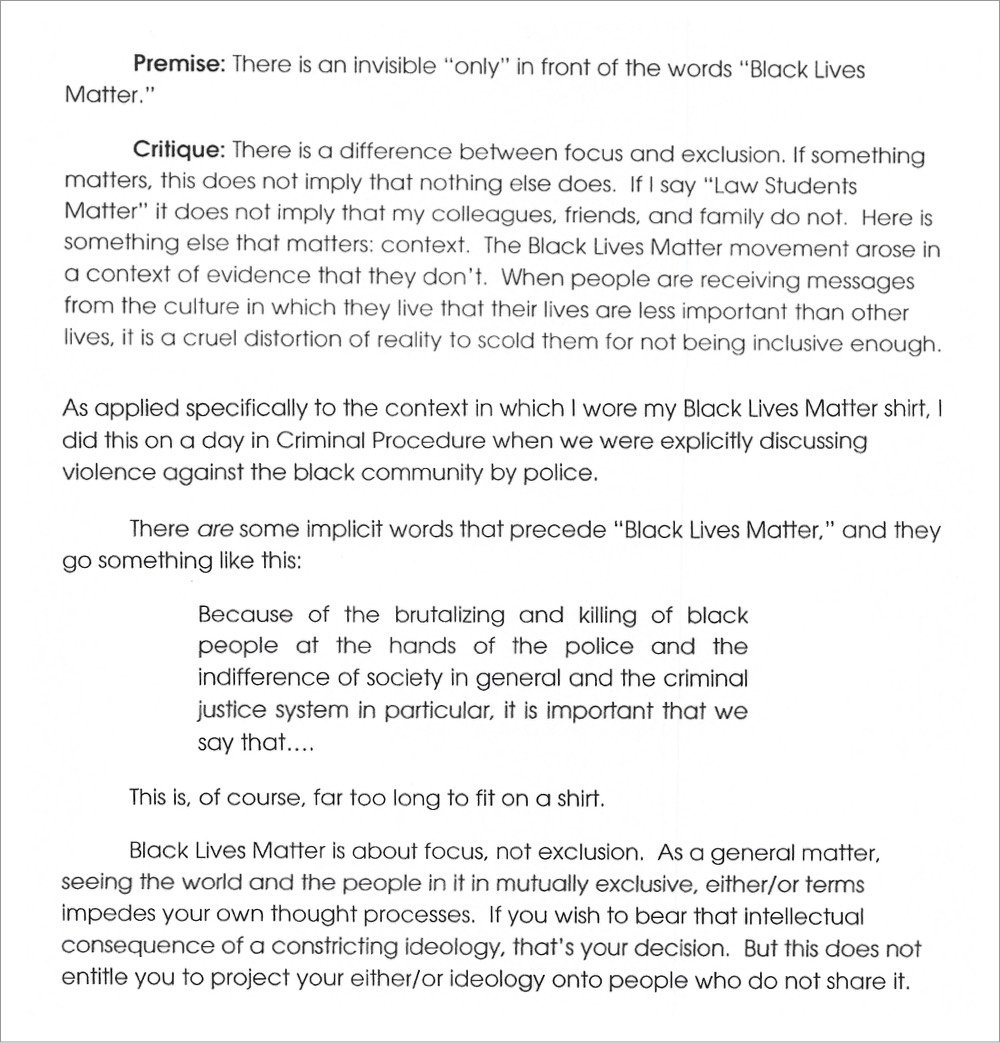Law Professor Skillfully Handles a “Black Lives Matter” Complaint From Her Students

For the curious and open-minded, many explanations of what “Black Lives Matter” means and what it doesn’t (e.g. White lives don’t matter) are readily available online. But in terms of pure clarity, it’s hard to beat what Whittier Law School professor Patricia Leary wrote in response to a letter sent to her by an anonymous group of students in 2016. This group of students was offended by Leary wearing a “Black Lives Matter” t-shirt on campus, writing in part:
We write this letter to you with concern about your inappropriate conduct at XXXXXXX Law School.
Specifically, you have presented yourself on campus, on at least one occasion, wearing a “Black Lives Matter” t-shirt. We believe this is an inappropriate and unnecessary statement that has no legitimate place within our institution of higher learning. The statement you represented and endorsed is also highly offensive and extremely inflammatory. We are here to learn the law. We do not spend three years of our lives and tens of thousands of dollars to be subjected to indoctrination or personal opinions of our professors.
XXXXXXX Law School has prided itself on the diverse demographics represented within the student body. Your actions however, clearly represent your View that some of those demographics matter more than others. That alienates and isolates all non-black groups.
As someone who is charged to teach criminal law, it should be abundantly clear to you and beyond any question that ALL lives matter, as it is expressed unequivocally in the law. Furthermore, the “Black Lives Matter” statement is racist and anti-law enforcement and has been known to incite violence in this country. As someone who is paid to teach the law, you should be ashamed of yourself.
If you’re going to argue with law professors, you should bring your A game, and Leary wastes no time in informing these students that they did not do so.
Premise: You are not paying for my opinion.
Critique: You are not paying me to pretend I don’t have one.
And on the meaning of “Black Lives Matter”:
Premise: There is an invisible “only” in front of the words “Black Lives Matter.”
Critique: There is a difference between focus and exclusion. If something matters, this does not imply that nothing else does. If I say “Law Students Matter” it does not imply that my colleagues, friends, and family do not. Here is something else that matters: context. The Black Lives Matter movement arose in a context of evidence that they don’t. When people are receiving messages from the culture in which they live that their lives are less important than other lives, it is a cruel distortion of reality to scold them for not being inclusive enough.
As applied specifically to the context in which I wore my Black Lives Matter shirt, I did this on a day in Criminal Procedure when we were explicitly discussing violence against the black community by police.
There are some implicit words that precede “Black Lives Matter,” and they go something like this:
“Because of the brutalizing and killing of black people at the hands of the police and the indifference of society in general and the criminal justice system in particular. It is important that we say that…”
This is, of course, far too long to fit on a shirt.
Black Lives Matter is about focus, not exclusion. As a general matter, seeing the world and the people in it in mutually exclusive, either/or terms impedes your own thought processes. If you wish to bear that intellectual consequence of a constricting ideology, that’s your decision. But this does not entitle you to project your either/or ideology onto people who do not share it.
The rest of her response is worth a read, particularly the part about the misconception that “what you think something means is the same as what it actually means”.
And then in part 2 of the letter, she rips the batteries right out of the anonymous students by critiquing how they wrote the letter.
Frame the issue precisely and then focus on it. Don’t overgeneralize. You begin by stating that the issue is my “inappropriate conduct,” which sounds very general. Then you narrow the issue to “specifically” one event that occurred on a particular day last semester. Your use of hyperbolic rhetoric throughout the memo suggests that you really are angry about more than just a T-shirt. If it really is about just the T-shirt, then by overgeneralizing from a specific occurrence, your message is swamped by exaggeration. If it really is about other “conduct” on my part, I can’t tell what that is. By the end of the memo you have lost focus completely, generalizing (in statements that are unexplained and inexplicable) about bar passage and about the faculty and administration of the entire law school.
Well, they did ask her to teach…





Stay Connected